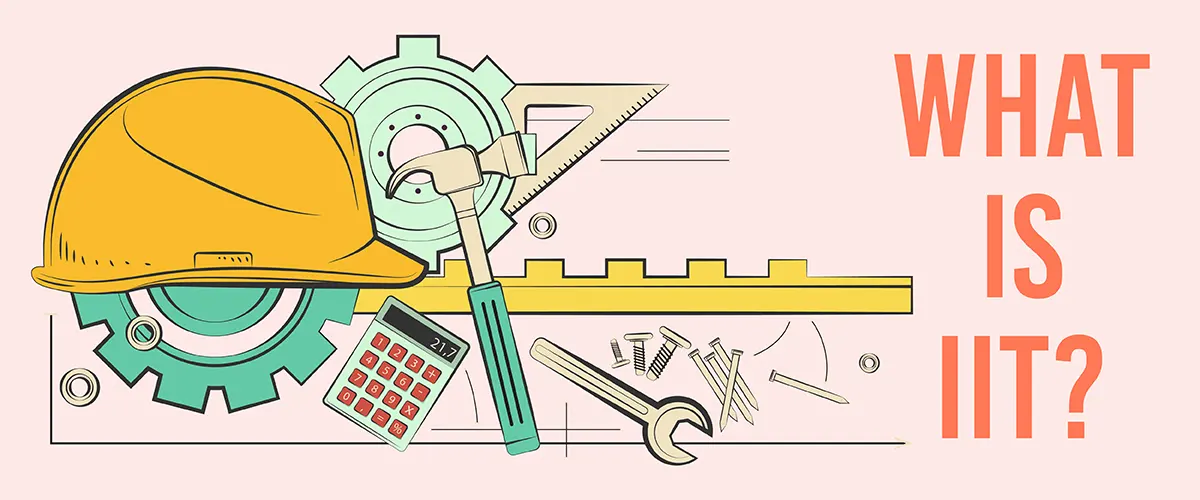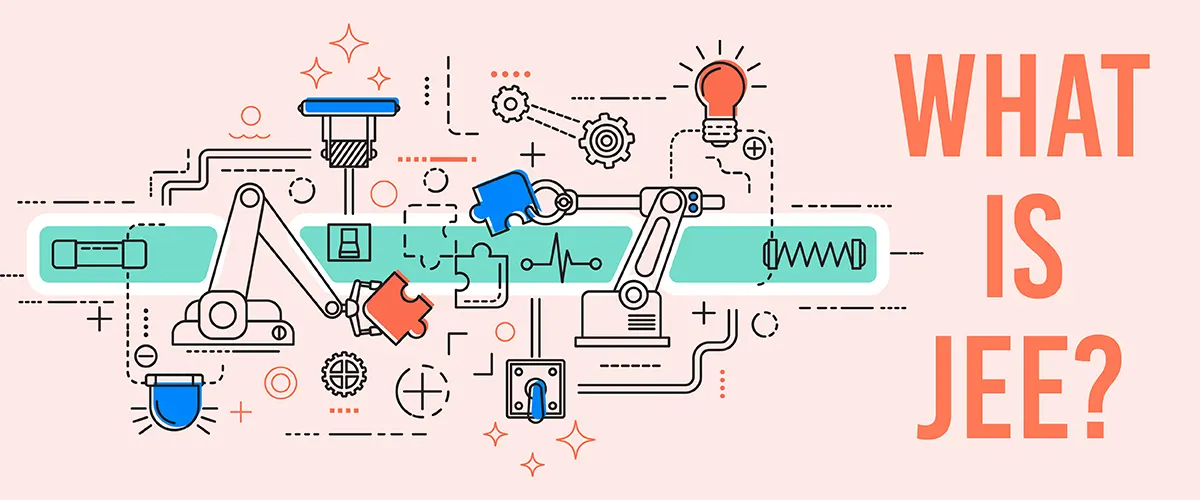An interesting discussion could be on the difference between IIT and JEE. Guessing, you might be an engineering aspirant and keen to understand the major difference between the JEE and IIT. You might have another reason to dig into this topic. Whatever be it, you’re at the right place. In this article, we will clear out your confusion between IIT and JEE.
JEE exam means Joint Entrance Examination to seek admission to the various engineering colleges in India. IIT, on the other hand, refers to the Indian Institute of Technology, the prestigious engineering institution with branches spread across the country. Let us discover more about their differences.
What is IIT?

What is the IIT exam? Well, understanding the concept of IITs will help you answer this question. It stands for the Indian Institute of Technology, a government-owned public technical institute with prestigious branches across the states of the nation. The inaugural Institute of Technology was established in May 1950 in Kharagpur, West Bengal.
Aspirants need to crack the toughest exam in India, which is the JEE, to be eligible for admission to the IITs. Millions dream of being a part of a highly prestigious organization like the IIT, but only a few can make it there. Based on the entrance scores, students are allocated seats in the respective IITs in the country.
Overall there are 23 IITs in India offering various undergraduate and postgraduate courses in Engineering and Technology. The student intake for these institutions at the B.Tech and M.Tech level stands at 9611 and 2534 respectively.
The main difference between IIT and JEE is the gateway to seeking a seat in the top IITs. The major courses offered by the prestigious branches in the county are
- Bachelor of Science (BS)
- Dual Degree (B.Tech-M.Tech)
- Dual Degree (BS & MS)
- Bachelor of Architecture (B.Arch)
- Bachelor of Design (B.Des)
- Joint MSc-PhD
- Master of Science (MSc)
- Dual Degree (MSc-PhD)
- Master of Design (MDes)
- Master of Business Administration (MBA)
- Master of Philosophy (M.Phil)
Candidates at IIT have an enriching experience learning from a world-class faculty and open a lot of opportunities for national and international recognition for worthy candidates. The top five IITs in India are:
- IIT Madras
- IIT Delhi
- IIT Bombay
- IIT Kanpur
- IIT Kharagpur
And that’s a step down toward understanding the difference between IIT and JEE.
What is JEE?

JEE is for the Joint Entrance Examination, an engineering entrance test held to assess the eligibility of various aspirants to different engineering institutions in India. If you’re an aspirant in the said field, you need to take the concerned examination and pass the assigned cut-off to be eligible for admission to various government and private engineering institutions in India.
The primary difference between IIT and JEE is that cracking the JEE opens the door to enter the prestigious IIT. The JEE exam has two parts, JEE mains and JEE Advanced.
While studying the IIT and JEE difference, it’s important to understand the stages of JEE Mains and JEE Advanced. Let’s have a look.
JEE Mains
JEE exam means a two-stage qualification assessment for engineering aspirants to ensure their eligibility in Indian engineering colleges. The first one is the JEE main exam. Candidates who clear this stage are eligible to move on to the next round which is the JEE Advanced.
Eligibility
There are a set of few criteria that the students need to fulfil to be eligible to sit for the JEE mains. The same is detailed below.
- Age: There’s no age barrier as such for aspirants. For example, if you’re to appear in the exam in 2023, you must have passed your 10+2 in 2021, 2022 or this year itself. Adhering to these criteria makes you eligible for the JEE mains irrespective of your age. However, you might need to satisfy the age criteria of the institution you seek admission.
- Qualification: Aspirants willing to sit for JEE mains must have completed their 12th boards from a recognized board.
Cutoffs
Candidates fulfilling this criterion can sit for the JEE mains. The cutoffs for this are yet to be out. Meanwhile, you can check out the JEE Mains cut-offs for 2021.
| Category | Cut Off |
| General | 87.9 |
| OBC-NCL | 68.02 |
| SC | 46.9 |
| ST | 34.673 |
| General-EWS | 66.2215 |
| PwD | 0.00964 |
Are JEE and IIT the same? Hopefully, by now, much of your doubts have been cleared. Let’s examine the second round of JEE, which is the JEE Advanced.
JEE Advanced
Another step towards understanding the difference between IIT and JEE is knowing the JEE Advanced details. The candidates who come out with flying colours after JEE Mains are eligible to sit for the Joint Entrance Examination Advanced. After the JEE mains results are out, the JEE Advanced applications are released. Candidates need to register themselves separately for the Advanced exam.
Eligibility
Let’s have a look at the eligibility criteria to appear for the JEE Advanced.
- Performance in JEE Mains: According to the JEE Mains 2023 criteria, students need to be among the top 2,50,000 successful candidates to be eligible for JEE Advanced.
- Age Limit: Candidates must have been born on or after October 1st 1998, to be eligible for JEE Advanced. Five years of age relaxation is applicable to reserved category candidates.
- Attempts: The candidates can have a maximum of two attempts in two consecutive years for the JEE Advanced.
Cutoff
Here’s the qualifying cutoff for JEE Advanced 2022.
| Category | Minimum Marks in Each Subject | Minimum Aggregate Marks |
| Common Rank List (CRL) | 5 | 55 |
| General EWS Rank List | 5 | 50 |
| SC Rank List | 5 | 50 |
| ST Rank List | 3 | 28 |
| Common PwD Rank List | 3 | 28 |
| OBC-NCL PwD Rank List | 3 | 28 |
| General-NCL PwD Rank List | 3 | 28 |
| SC PwD Rank List | 3 | 28 |
| ST PwD Rank List | 3 | 28 |
| Preparatory Course (PC) rank lists | 1 | 14 |
Top Colleges under JEE

What is IIT and JEE, seem to be clear to you by now. Aspirants with top ranks in JEE Advanced exam make it to the top engineering colleges in the country. IIT institutions are one of the major names on the list. Here’s a list of the top 10 engineering institutions in the country.
- IIT Bombay
- IIT Kharagpur
- IIT Roorkee
- IIT Madras
- Vellore Institute of Technology
- IIT Kanpur
- Jadavpur University, Kolkata
- Indian Institute of Science, Bangalore
- National Institute of Technology, Tiruchirappalli
- IIT Guwahati
Students often have the question: how to prepare for JEE? The short answer is an exhaustive study complemented by smart work. You need to strategize your study schedule, follow the best JEE preparation books and take sample tests to boost your preparation.
Many students often have questions about JEE vs NEET. Well, NEET stands for National Eligibility cum Entrance Test which is a pre-medical assessment to test the eligibility of aspirants willing to pursue an undergraduate in Medical.
Wrapping Up
We hope you can understand the difference between IIT and JEE by now. To keep it short, JEE is the engineering assessment to test the eligibility of aspirants to various Engineering colleges in India. IITs, on the other hand, are prestigious technical institutions with branches all across India that offer admission to eligible candidates with a high JEE Score.
What’s the college you wish to study engineering at? We wish you the best for your JEE!

FAQs on Difference Between IIT and JEE
Q1. How to prepare for competitive exams?
Ans. Preparing for competitive exams will need you to follow a strong study schedule, excellent guidance and lots of hard work. Taking sample mock tests is also recommended to enhance your preparation before the finals.
Q2. Is IIT and JEE the same?
Ans. No, technically, JEE and IIT are not the same. JEE stands for Joint Entrance Examination, held to assess aspirants for admission into top engineering colleges. IIT stands for Indian Institute of Technology, with branches spread across the country to allot candidates with top JEE ranks.
Q3. Can I get into IITs without JEE?
Ans. Yes, you can get into IITs without JEE in any course other than B.Tech. Various other exam scores accepted in the IITs are Joint Admission Test (JAM), GATE (Graduate Aptitude Test in Engineering), Undergraduate Common Entrance Examination (UCEED), etc.
Q4. Can I get into IIT after Diploma?
Ans. No, seeking admission to the top IITs in the country needs you to crack the JEE Advanced with a high rank. IITs don’t offer admission to students directly after their Diploma.

